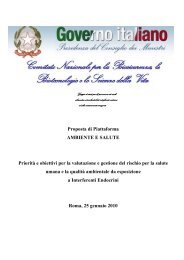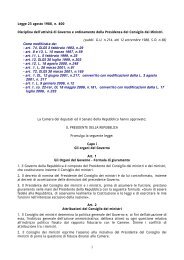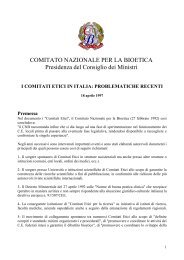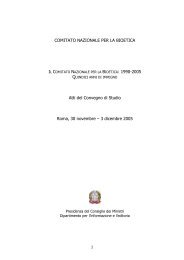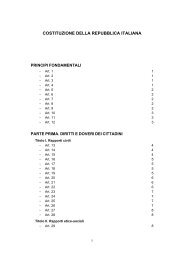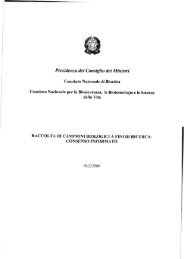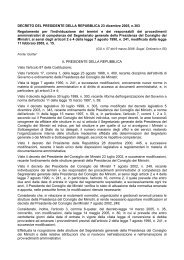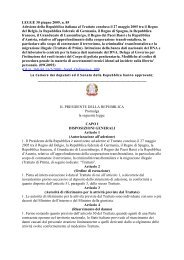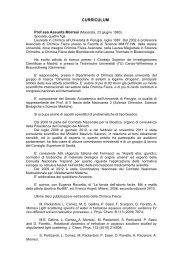President
President
President
You also want an ePaper? Increase the reach of your titles
YUMPU automatically turns print PDFs into web optimized ePapers that Google loves.
appropriate performance, guaranteeing a unified system. The Government and<br />
the Regions have identified the strategic sectors in which to operate in order to<br />
improve regional healthcare services and guarantee the satisfaction of the<br />
citizens’ needs and at the same time more control over expenses. With regards<br />
to the elderly, the focus has been placed especially on gradual disability over<br />
the years. The main cause of the marginalisation and then isolation of the<br />
elderly is not however due only to their possible disability, but it must be<br />
identified, as we have seen, in the loss of their social and productive role, which<br />
causes a decrease in their financial potential, a feeling of loneliness and finally,<br />
not uncommonly, a strong sense of uselessness accompanied by a loss of selfesteem.<br />
Moreover, the Pact highlights a need to know these factors, which then<br />
affect the regulations, recognising that the need of elderly people are also by<br />
and large not only “material”. Consequently, the Guideline for the realisation of<br />
an integrated system of interventions and social services (Law of the 8 th of<br />
November 2000, No.328) expressed the clear intention of intervening on the<br />
different sectors of social life, integrating – through the implementation of a<br />
system of local networks – the services to the person and to the family,<br />
anticipating financial incentives aimed at optimising the resources and avoiding<br />
clashes of authority and the sectorialisation of the responses. This overall<br />
vision has been taken on by the three-year Plans of the National Healthcare<br />
Service agreed upon so far, which have never failed in highlighting how the<br />
needs of the elderly must be at the centre of an healthcare service that is<br />
varied in its methods and ways of care (unfortunately not always carried out or<br />
made possible): this is the so-called “third economy”, aimed at making sure that<br />
“the elderly who are not supported by a family can, with their own economic<br />
activity, express their freedom and at the same time contribute to the individual<br />
and collective well-being” 294 . As already highlighted by the National Bioethics<br />
Committee (NBC, 2006), when we talk about the elderly we cannot reduce the<br />
discussion merely to demographic and economic data without taking into<br />
account their equal dignity in comparison to other citizens, regardless of their<br />
age, their health conditions and the contribution they are able to make,<br />
because their presence in itself contributes to the well-being of society. And<br />
more, alongside the Report “World Population Ageing 2007” by the United<br />
Nations – which states that “there are numerous ways in which the elderly can<br />
express themselves and feel fulfilled: continuing to participate to family life,<br />
practising voluntary work, acquiring new knowledge, enrolling in courses,<br />
expressing themselves through arts and crafts activities, participating in<br />
community organisations and associations of the elderly or religious,<br />
recreational, touristic activities, working part-time or being part of the political<br />
life as informed citizens…” 295 – a variety of ways to participate to activities,<br />
courses or other have been planned, and in some cases realised locally,<br />
suggested by the various local Administrations (Attachment II).<br />
According to the White Book on the future of the social model by the<br />
Ministry of Labour, Health and Social Politicies, published in 2009, which<br />
register the data of the “the level of generational separation of the elderly who,<br />
more and more often, live only with other elderly people, in particular in rural<br />
areas that are going through a depopulation”, this new situation “imposes<br />
294 M. Trabucchi, Perché Terza Economia, in: Fondazione onlus socialità e ricerche – La<br />
Scienza dell’assistenza. Terza Economia sempre più valore dalla terza età. Quaderno No. 2,<br />
The European House Ambrosetti, 22 nd of January 2008, p. 4.<br />
295 www.unpopulation.org.<br />
228





